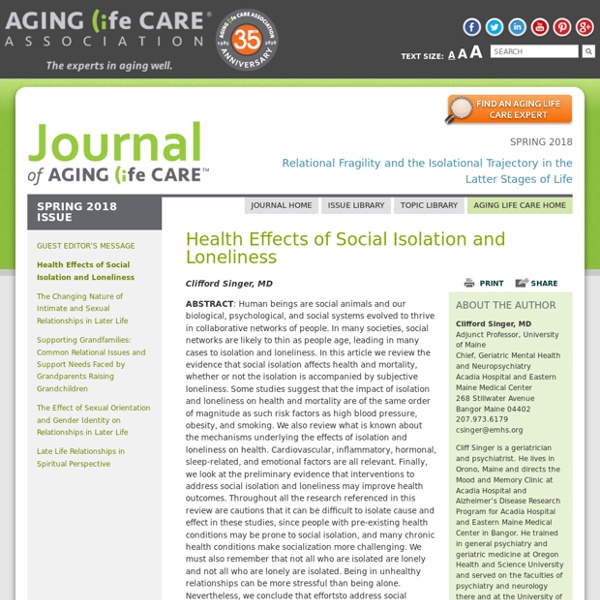How social isolation affects the brain
Daisy Fancourt was at her home in Surrey in southeast England when the UK government formally announced a nationwide lockdown. Speaking in a televised address on March 23, UK Prime Minister Boris Johnson laid out a suite of measures designed to curb the spread of COVID-19, including closing public spaces and requiring people to stay home except for exercise and essential tasks. For Fancourt, an epidemiologist at University College London (UCL), the announcement meant more than just a change to her daily life. It was the starting gun for a huge study, weeks in the planning, that would investigate the effects of enforced isolation and other pandemic-associated changes on the British public. We’re a social species. We really need others to survive.
‘Social recession’: how isolation can affect physical and mental health
As the Covid-19 pandemic continues, millions of people in the US are coming to terms with being increasingly cut off from society. Beyond the inconvenience of working from home, or not being able to go to bars, restaurants or cinemas, however, experts have found that social isolation can have a profound effect on people’s physical, as well as mental health. Long-term, isolation even increases the risk of premature death. It’s being called a “social recession” to match any economic downturn also caused by the growing pandemic and it can have profound physical and psychological effects. “People who are more socially connected show less inflammation, conversely people who are more isolated and lonely show increased chronic inflammation. Chronic inflammation has been implicated in a variety of chronic diseases,” said Julianne Holt-Lunstad, a professor of psychology and neuroscience at Brigham Young University.
The effects of isolation on the physical and mental health of older adults
With the world in the grip of the covid-19 pandemic, unprecedented restrictions have been placed on social freedoms. The UK government has asked those aged 70 years and older to follow strict social distancing measures to reduce the transmission of, and susceptibility to, covid-19. These restrictions involve: reducing social mixing in the community, not having friends and family visiting the house, and minimising the use of public transport. Moreover, individuals with certain high-risk conditions are advised to not leave the home at all. [1] While undoubtedly vital to reduce the impact of covid-19 on this vulnerable group, which is more susceptible to severe disease, these interventions carry risk, particularly on physical activity profiles and on mental health. How can we mitigate this?
Social Isolation: Symptoms, Prevention, Treatments
To evaluate whether someone is socially isolated and, if so, provide resources to combat it, AARP Foundation joined with the Gerontological Society of America, Give an Hour, the National Association of Area Agencies on Aging, and UnitedHealth Group to create connect2affect. This online tool provides 12 "yes" or "no" questions to determine if a person is at high, medium or low risk for isolation. Questions deal with issues such as how much contact the person has with others each week; whether they have access to transportation; and how much companionship they have. For those shown at risk of isolation, connect2affect offers suggestions for getting reconnected to the outside world. The searchable directory provides local access to rides, activities at senior or community centers, and volunteering opportunities. Experts say senior and community centers can play a very useful role in building healthy connections.
14 Ways to Help Seniors Avoid Social Isolation -
A vast body of evidence demonstrates the physical benefits of a healthy social life. Conversely, loneliness and social isolation have been clearly linked to poor health outcomes. Numerous studies have shown that socially isolated seniors even have a shorter life expectancy. “A Review of Social Isolation” by Nicholas R.
Ways to overcome or avoid social isolation for caregivers
There's a difference between isolation and loneliness. Social isolation is the physical separation from other people--a literal lack of social connections or interactions. Meanwhile, loneliness is an emotional response to social isolation--the discrepancy between a person's desired and actual social relationships. In other words, loneliness is the subjective distressed feeling of being alone or separated, while isolation is objective.
Social Isolation and Memory Decline in Later-life
Skip to Main Content Advertisement Search Close Advanced Search Search Menu
The unspoken COVID-19 toll on the elderly: Loneliness
Mary Faines just turned 94 years old. For years the tradition has been to celebrate her special day with a festive dinner with her husband, son and daughter-in-law. It took a pandemic to break the long-standing tradition. “This year was the first time we don't go out and celebrate with a dinner party. That has always been a big treat,” Faines told ABC News. The implementation of physical distancing is an essential step in reducing transmission of the virus.



